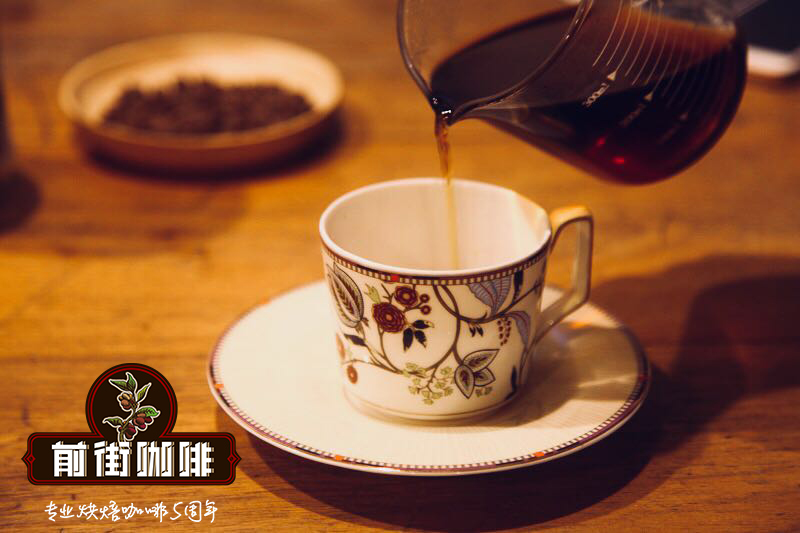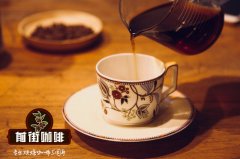Coffee Manor-Erida Manor in Panama (Elida Estate Coffee)
Professional coffee knowledge exchange more coffee bean information please follow the coffee workshop (Wechat official account cafe_style)

Coffee producing areas are distributed in different parts of the world, mainly in several major producing areas, such as Central America, South America, Africa, Southeast Asia, Yunnan, China, etc., different manors in different producing areas, depending on altitude, soil, temperature, precipitation and so on, the aroma and taste of coffee are also different. like the grading system of red wine, fine coffee emphasizes "traceability and transparency" of coffee. Can be traced back to each packet of coffee beans produced to which manor, coffee beans growing altitude, precipitation, soil and other details, such as the way of treatment. Take you into the manor, look at the growing environment of each coffee bean, and explore the conditions for the formation of coffee bean flavor.
When we come to Central America this time, Central America (Central America) refers to the central part of the American continent south of Mexico and north of Colombia, bordering the Caribbean Sea to the east and the Pacific Ocean to the west. It is also a narrow strip of land connecting South America and North America. It includes seven countries: Guatemala, Belize, El Salvador, Honduras, Nicaragua, Costa Rica and Panama.
Elida Estate Manor is located in the Pokuit producing area of the western border province of Panama. The most famous landmark and tourist attraction of the province is the Baru volcano, which is 3300 meters above sea level. The Baru volcano is one of the highest volcanoes in Central America, with a total area of about 14000 hectares. It can be divided into seven different microclimate zones according to altitude, within which there are many rare plants, birds and mammals. Therefore, it is set up for the protection of national parks, and hunting and man-made development and destruction are prohibited.

Go to Alida via Salto

Alida's family nursery said

Weaver, the owner of the manor. Wilford Lamastus gets out of the car to pick wild berries and tree tomatoes on steep terrain.
In the rear are the cash crops he can pick and sell to Panama City, the capital, where sales are said to be very good.


The Pokuit producing area is located on the east side of the Baru volcano, a valley flowing by lava, next to the Vulcan Valley (Volcan Valley), another well-known coffee producing area in Panama. Pokuit has always been the most high-profile coffee producing area in Panama, and there are many famous estates in the region-such as Esmeralda, which is famous for its rose summer Geisha variety World War I, Hartman, Mama Cata, Kotowa, Santa Teresa, which are always victorious by Best of Panama. Alida Manor itself is also a heavyweight star manor in Pokuit-has won Best of Panama awards for the past five years in a row, second only to Jade Manor.


Elida Manor has a total area of 65 hectares, more than half of which are located within the Baru Volcano National Park, 30 hectares of the estate are planted with coffee trees, and the remaining 35 hectares are virgin forests. Coffee is grown from 1670 to 1850 meters above sea level, making it one of the two highest coffee farms in Panama (the other estate with these elevations should be Carmen in the Vulcan Valley).

Budding coffee seedlings

At such a high altitude, the low temperature delayed the ripening of the coffee berries, about a month later than the normal ripening period, while the fertile volcanic soil provided sufficient nutrients for the coffee, coupled with the excellent microclimate brought by the Baru volcano, Elida Manor was able to achieve good results in cup test competitions.
Alida's treatment plant is located halfway between the nursery and the manor, or in the manor, the road is not bad, the road is directly accessible, it is located here, and it is convenient for trucks to get in and out of the house to carry coffee. The picture shows the dried honey beans with shell beans, next to the simple treatment field and the storage area with shell beans.
In addition to creating good coffee cultivation conditions, the Lamastus family, which runs the Elida estate, has also planted many different native tree species on the estate, not only to shade the coffee trees, but also to provide a friendly habitat for birds. In terms of fertilization, the Lamastus family uses artificial fertilization and a small amount of chemical fertilizers, but never uses pesticides and herbicides that are harmful to the environment.

Red ripe coffee cherries
At present, in addition to Kaduai Catuai, Iron pickup Typica and Bourbon Bourbon, the Lamastus family also began to grow Rosa Geisha a few years ago. In spite of this, Elida Manor used Catuai in all the batches of the Best of Panama competition, but achieved good results again and again, which shows the excellent quality and special flavor of coffee brought by its geographical environment and excellent postharvest treatment technology.
Name of the manor:
Alida Manor / Alida (ELIDA ESTATE COFFEE)
Country:
Panama (Panama)
Location of the manor:
Ertu gave it to Pocket (Alto Quiel,Bouquete)
Annual output:
About 400 bags (60 kg / bag)
Area of the manor:
65 ha (30 ha to grow coffee and 35 ha to retain virgin forest)
Coffee tree age:
The old seed area is 40 years old, and the rest is 5 years on average.
Altitude:
1700m to 2000m
Main varieties:
Kaduai Catuai 85%, Iron truck Typica and Bourbon Bourbon15%, Rose Summer Geisha a small amount
Flowering period:
March, April and May
Picking period:
January to April
Soil quality:
Volcanic soil (Volcanic clay)
Average annual precipitation:
2400 mm
How to handle it:
Sun exposure (Natural)
Dry incense:
Dark berries, sweetness, manor chocolate, flower, grease.
Wet incense:
Sweet honey, berry, blackcurrant, red raspberry, a variety of rich sweet and sour aromas.
Palate:
Imported black berry flavor is obvious, very clean and full, good greasy, sweet and sour fusion, blackcurrant, high-altitude tomato flavor, cranberry, greasy very long-lasting.
Important Notice :
前街咖啡 FrontStreet Coffee has moved to new addredd:
FrontStreet Coffee Address: 315,Donghua East Road,GuangZhou
Tel:020 38364473
- Prev
Coffee Manor-introduction of Rose Summer Coffee beans and Iron pickup Coffee beans in Erida Manor, Panama
Professional coffee knowledge exchange more coffee bean information Please pay attention to coffee workshop (Wechat official account cafe_style) Coffee producing areas are distributed in different parts of the world, mainly in several major producing areas, such as Central America, South America, Africa, Southeast Asia, Yunnan, China, etc., different manors in different producing areas, due to different altitude, soil, temperature, precipitation, etc., coffee aroma and taste are also different.
- Next

Coffee Manor-Erida Manor in Panama (Elida Estate Coffee)
Professional coffee knowledge exchange more coffee bean information Please pay attention to coffee workshop (Wechat official account cafe_style) Coffee producing areas are distributed in different parts of the world, mainly in several major producing areas, such as Central America, South America, Africa, Southeast Asia, Yunnan, China, etc., different manors in different producing areas, due to different altitude, soil, temperature, precipitation, etc., coffee aroma and taste are also different.
Related
- Does Rose Summer choose Blue, Green or Red? Detailed explanation of Rose Summer Coffee plots and Classification in Panamanian Jade Manor
- What is the difference between the origin, producing area, processing plant, cooperative and manor of coffee beans?
- How fine does the espresso powder fit? how to grind the espresso?
- Sca coffee roasting degree color card coffee roasting degree 8 roasting color values what do you mean?
- The practice of lattes: how to make lattes at home
- Introduction to Indonesian Fine Coffee beans-- Java Coffee producing area of Indonesian Arabica Coffee
- How much will the flavor of light and medium roasted rose summer be expressed? What baking level is rose summer suitable for?
- Introduction to the characteristics of washing, sun-drying or wet-planing coffee commonly used in Mantenin, Indonesia
- Price characteristics of Arabica Coffee Bean Starbucks introduction to Manning Coffee Bean Taste producing area Variety Manor
- What is the authentic Yega flavor? What are the flavor characteristics of the really excellent Yejasuffi coffee beans?

